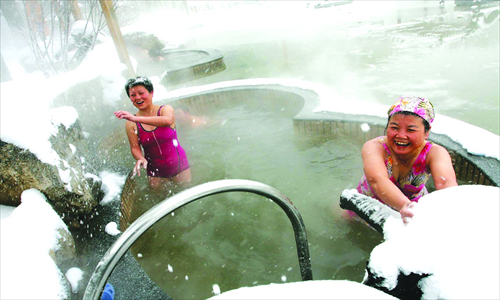Trendy hot springs raise health concerns

As Beijing's winter temps keep dropping to new lows, hot springs are becoming the essential weekend destination for Beijingers.
Wu Yunfei, a 28-year-old assistant researcher in atmospherical sciences at the Chinese Academy of Sciences, said he gets the chance to bathe in hot springs about once a year.
"I choose to bathe because a lot of other people are bathing. I'm just following a trend," he said. "So many people bathe in the hot springs, so there must be some health benefits."
However, even though the hot springs are reputed to have beneficial effects, doctors say the hot springs are not some supernatural elixir and that there are many risks involved in overdoing it, from light-headedness to infertility.
Even for young and healthy people, hot springs have risks that often are not posted.
Liang Naizhi, a 23-year-old student of computer science at Peking University, said her two hot spring trips had not been the best experiences. She first visited Jiuhua Shanzhuang, Changping district, in 2007.
"It was my first time bathing in hot spring and I thought it was magical, like a hot bath," she said. "However, afterwards, when I finished and went to take a shower, I felt really dizzy for a while."
In June last year, she gave the hot spring in Wangjing Shunjing, Chaoyang district, a try and experienced the same dizziness.
"I then heard the best time would be half an hour or 20 minutes, and I had bathed for more than an hour. But no one had informed me about this beforehand," she said.
Yan Hongbiao, a doctor at the Fuwai Cardiovascular Hospital, said he has been in Japan for a long time and considers the hot spring situation in Japan to be entirely different from China.
"In Japan, bathing in the hot springs is a very popular and enjoyable thing. But in Japan, the hot springs are a more natural resource. It's underground water with a lot of minerals, such as sulfite," he said.
In China, there are many fake hot springs and the quality cannot be ensured, he said.
Furthermore, the positive effects of the hot springs have been exaggerated, he said. Even though the hot springs can help with cardiovascular functions because of their temperature and the sulfite and minerals in the water can help treat skin diseases, it is not as the Chinese believed that the hot springs will treat and help prevent many diseases.
Qiao Jie, a gynecologist at the Peking University Third Hospital, points out that hot springs can be more of a risk than a treatment for those with cardiovascular conditions.
"Since the temperature is high and will enlarge the blood veins and change the blood cycle, for people with cardiovascular diseases, it's dangerous," she said. "For people who have not had children, the temperature has bad effects on the male sperm and may influence fertility."
She underscored that pregnant women in particular should stay away from the hot springs.
"It's advised they bathe in water close to body temperature and not above 38 C, which is what most hot springs go over," she said. "Hot springs might have bacteria as well as hot temperatures. It's bad for the fetus. Pregnant women also have a low resistance to diseases and might go into early labor as a result of using hot springs."
Yan advises choosing an appropriate bathing duration.
"There's a relatively short time for everybody. Bathing for hours - no one can take it," he said.